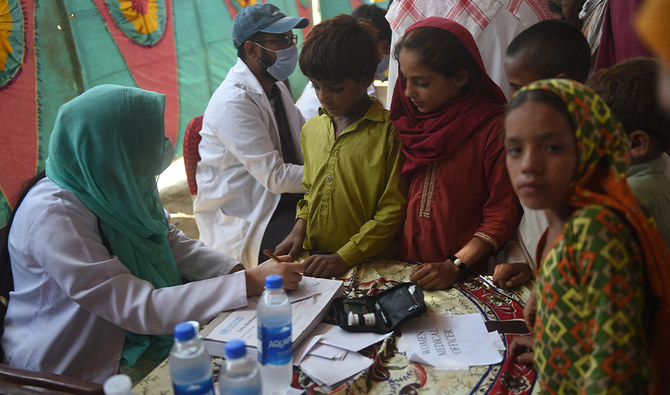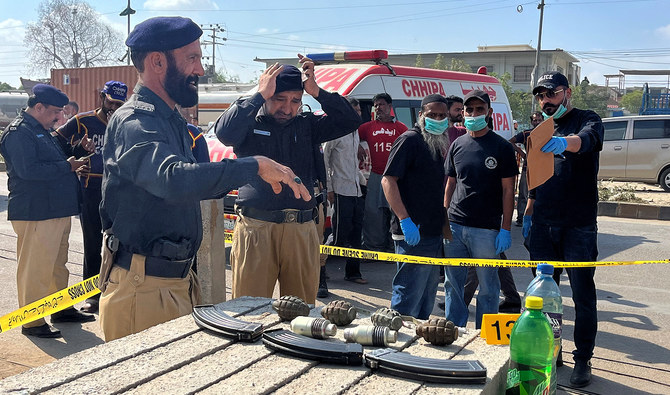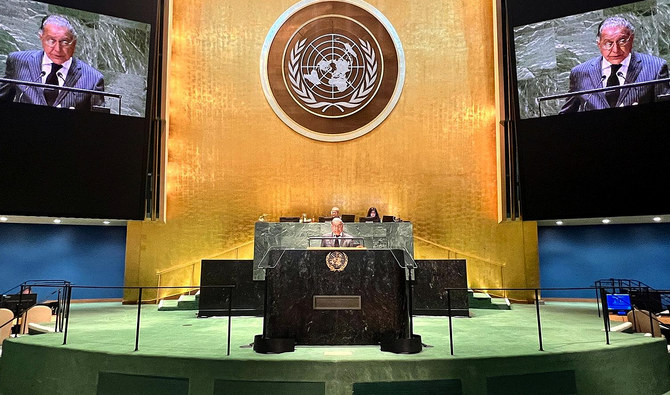ISLAMABAD: Pakistan is facing a disaster within a disaster as diseases spread rapidly and deaths mount following widespread deadly flooding — a crisis worsened by the country’s weak health system and lack of emergency planning, medical experts warn.
Flooded areas stretching over hundreds of kilometers have become breeding grounds for malaria, dengue fever and diarrhea, with hundreds of thousands of displaced people living out in the open and with little option but to drink unsafe water.
In Sindh — the province hardest hit by the floods — at least 342 people have died from diseases and more than 3.3 million infections have been recorded since July 1, state data shows. Nationwide, there have been 4.4 million disease cases reported.
The flooding — triggered by record monsoon rains and glacial melt, both exacerbated by climate change, scientists say — has killed at least 1,678 people.
But Zafar Mirza, who resigned as a special assistant to the prime minister and from a role as the country’s de facto health minister in 2020, said disease could prove a bigger threat to the country’s health system.
“It can kill more people than those who lost their lives in the flood,” added Mirza, now a professor of health at Shifa Tameer-e-Millat University in the capital Islamabad.
Yet Pakistan’s authorities are ill-prepared to respond to health threats arising out of growing climate-fueled disasters such as the flooding, Mirza said, adding that the country does not have “a well-thought-out strategy to deal with them.”
Diseases are running rampant in regions such as southeastern Sindh because medical services have been disrupted by the floods and the cash-strapped government is struggling to reach people in need, according to both health experts and state officials.
The World Health Organization (WHO) has warned about the potential for “a second disaster, a wave of disease and death,” and Pakistan’s planning minister Ahsan Iqbal said last week that “we fear it (the outbreak of diseases) may get out of control.”
DISEASE AND DESPAIR
The government is striving to ensure that flood-hit people receive medical treatment and working to stop the spread of diseases, although getting access is difficult, according to Qasim Soomro, Sindh’s parliamentary secretary for health.
He said doctors with support staff and ambulance services were being sent to areas where the water is receding or has done so, with at least 600 mobile teams having been deployed so far.
However, it is tough for the teams to access and support people in places still submerged, the lawmaker added.
Floods have partially or completely damaged more than 1,000 health facilities in Sindh, according to the provincial health department.
People living in far-flung rural parts of Sindh have no access to clean drinking water and health services, said Mirza Ali Azhar, former general secretary of the Pakistan Medical Association (PMA).
“The spread of disease is enormous and unimaginable and the ... cases are much higher than (what is) being reported,” Azhar said.
Even the doctors who are treating patients in frontline medical camps can only work for a few hours each day as they must return to cities at night because they have nowhere to stay in flood-hit areas, he added.
“The sick people are not getting continuous medical care, which they require,” Azhar said.
Going forward, he called upon the government to strengthen health infrastructure in disaster-prone areas.
Some Pakistan-based tech start-ups and non-profits are trying to play a part in limiting the spread of disease by providing emergency access to clean drinking water.
One start-up, PakVitae, said it had so far distributed 15,000 small-scale water purifiers to flood-affected areas — including Sindh.
“We are planning to distribute a total of 100,000 units to flood-affected families by the end of October, as we have enough donations to meet the target,” Shayan Sohail, the compny’s founder and chief operating officer, said by phone.
CALL FOR CRDaesh PLAN
Pakistan’s response to the flooding and ensuing disease outbreaks has suffered from a lack of coordination between different government institutions and departments, as well as within the health care system itself, according to Mirza.
A shortage of cash and medical staff and the absence of policies and mechanisms to quickly mobilize and deploy health workers during a crisis are also a hindrance, both Mirza and Azhar said.
“We need to develop a national health emergency preparatory plan,” Mirza said.
That should include planning on where to site emergency medical camps, how to establish the local availability of doctors and medicines, and factoring in prior knowledge of disease prevalence by region, he said.
Such planning should be overseen by the National Disaster Management Authority and implemented in a time of normalcy to boost the capacity of Pakistan’s health care system, he added.
The country is prone to setting up institutions in response to emergencies — such as the newly-formed National Flood Response and Coordination Center — which are then dismantled soon after a crisis is over, Mirza said.
“This is also a reflection of our ad-hocism,” he said, urging the government to instead invoke the existing emergency law — the National Disaster Management Act 2010 — to cope with crises.
As well, the government should engage the private health care industry — which accounts for 70 percent of the total sector — to respond during emergencies and help back up public services, Mirza said.
Sindh lawmaker Soomro said the provincial government had learned lessons from the Covid-19 pandemic and was planning to replicate the model to make the health system responsive to climate change-worsened crises as well
The province has started work to identify key locations where the health system can “re-assemble and move quickly” in emergencies, and is thinking about how to arrange boats, off-road vehicles and specialist training for doctors to cope with future disasters, he said.
But for now, many flood-hit Pakistanis are still waiting for help.
Khuram Shahzad, a 38-year-old who lives in Punjab province, said two-thirds of his village was affected by floods at the end of July. Most mud houses were washed away, he said.
“We are faced with two-fold problems,” he said by phone, explaining how diseases such as malaria and skin conditions were spreading fast, especially among children and women who were living in tents or in the open due to the destruction.
Health workers had not visited his village of Basti Ahmadani — located in the Dera Ghazi Khan district — in over a month, he said, adding that people were resorting to seeking help from unqualified doctors.
Now, “the winter season is fast approaching, increasing worries of the people,” Shahzad added.
















